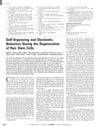A Family Business: Stem Cell Progeny Join the Niche to Regulate Homeostasis
January 2012
in “
Nature Reviews Molecular Cell Biology
”

TLDR Stem cell offspring help control their parent stem cells, affecting tissue health, healing, and cancer.
The document reviews the role of stem cell progeny in regulating the behavior and activity of their parent stem cells within various niches, such as those found in the Drosophila melanogaster testis, mouse hair follicle, intestine, and bone marrow. It explains how committed stem cell progeny provide feedback signals to stem cells, contributing to tissue homeostasis, wound repair, and cancer. The review details how cyst stem cells (CySCs) can become niche cells in the testis, how hair follicle stem cell (HFSC) progeny produce factors that regulate stem cell quiescence in the hair follicle, and how Paneth cell progeny maintain intestinal stem cells (ISCs) in the intestine. It also describes the mobility of hematopoietic stem cells (HSCs) and the influence of their progeny, such as regulatory T cells and macrophages, on their behavior. The document concludes that understanding the feedback mechanisms between stem cells and their progeny is crucial for advancing regenerative medicine and cancer treatment.












